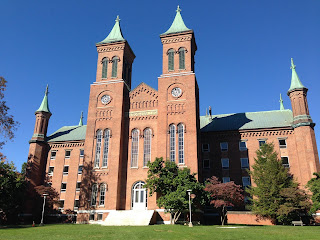My Mozart is another kind of story. While the
characters are the same people who appear in
Mozart’s Wife, they are viewed through another narrator’s eyes. As in Rashomon—or in many court cases—witnesses,
even those with the best intentions, often tell conflicting stories. Back in
the mid-eighties, when I wrote My Mozart,
I was unable to discover much about the life of Anna Gottlieb. What there was in
German and not translated or easily available here. As a result, I
fictionalized my heroine. The historical Anna and the one I created are, in many
ways, quite different.
Here is a
brief outline of what I have since learned about the historical Anna Gottlieb.
She was born into a theatrical family who worked for the National Theater, just
as mine was, however, in real life, she was one of four daughters. Anna was
five when she played her first noted role at the Burgtheater. Aged twelve, she played Barbarina in Mozart’s
Figaro. At fifteen she played ‘Amande’ in Wranitzky’s Oberon, King of The Elves. At seventeen, she was Mozart’s Pamina in
The Magic Flute at The Theater Am
Weiden, which would be the peak of her career. According to Agnes Selby, author of the
well-respected Constanze, Mozart’s Beloved,
a much older Anna was to remember: "The
immortal Mozart created Pamina for me, and the same voice which is now
unpleasant to you, was the delight of the great master, and I was, proud as a
queen, carried on the waves of applause." She also recalled his gift of a
beautiful fan given her by Mozart in appreciation of her artistry.
After Mozart’s death, Anna “defected” to the Leopoldstadt Theater. In 1798 she
played the part of ‘Hulda’ in The Nymph
of the Danube. She was famous as a mimic, and she often parodied reigning
prima donnas. According to Grove, during this time she was “a mainstay of the
company.”
The
Napoleonic Wars ruined the economy and disrupted the ancient social and
patronage system. After a four year’s absence, occasioned by war, Anna returned
to the Viennese stage in 1813. Sadly, her voice and looks were now in decline.
As a result, she now played smaller roles in comedies and often played old women.
In 1828, a new director of the theater, Steinkeller, dismissed her. Lacking a
pension, she fell into poverty. She unsuccessfully petitioned the Emperor for a
pension. In 1848, she contacted the newspaper editor L.V. Frankl, to describe
her plight, and he organized a fundraising campaign which sent her to Salzburg
to view the unveiling of the Mozart memorial, which she longed to see. In one memoir concerning that day, Anna is
thus described: “There entered a tall, thin and eccentric looking old woman…” She was the last surviving singer who had
actually worked with Mozart.
So it
appears that My Mozart is more “historical
fiction” than semi-biographical. In my defense, I’ll plead that I’d
fallen in love with the composer. As anyone who has caught the all-consuming Amadeus
bug knows, this isn’t a minor ailment, nor is it unusual among people who adore
music. The effect of a Mozart Possession
is visceral, shattering, as I’d imagine a gigantic dose of
Ecstasy. I was Mozart’s fan, body and soul, and I wanted to write a story which
expressed my love, my longing, and, most of all, the physical pleasure
which his music brought to me. To write such a story, I needed a narrator, someone who could be that
delirious, head-over-heels fan. One evening, while reading Otto Erich
Deutsche’s Documentary Biography of
Mozart , I came across this quote:
"Most painfully affected of all
by Mozart's fatal illness was Fraulein Nanina Gottlieb..."
~~~From Joseph Deiner's Memoirs,
related at Vienna, 1856
There is
another matter to consider, too, and to me it’s not a small thing. As a writer,
I’ve created many characters, working from the rough outline in my mind, until
these “playmates” begin to talk and walk on their own, to tell me their
stories. Nanina was different. From the evening I saw Joseph Deiner’s remark, I
was visited by a presence--graceful, feminine—and deeply anguished. She came in
the dark hours and sent me to the computer to write for most of the night,
write a story as I’ve written no novel since. Pictures would arrive; I’d hit
those keys. As I worked with “her,” I typed ever faster, while a story of a
perfect first-and-only-love, of loss and of madness poured out. There was very
little editing done until much, much later.
Call it
“automatic writing” or whatever you want. I’m not a big fan of categorizing
paranormal events, although I’ve had more than a few in the seventy years I’ve
been on the planet. Whatever this unique
experience was, I felt honored to be the chosen channel for a sensitive,
talented individual—perhaps a beautiful soul from a time in Vienna where, ever
so briefly, lived and loved a matchless musical genius.
And, if you've got a moment, hop on over to these other talented Books We Love Authors:
http://triciamg.blogspot.com/ (Tricia McGill)






























